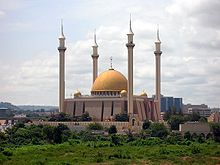
Brooke Flake
Nigeria’s population of 158 million people is composed of nearly equal numbers of Muslims and Christians. Popular estimates describe religious composition as 50% Muslim, 40% Christian, and 10% practitioners of indigenous religions (IRFR2010).
- Islam. Of those who practice Islam, Sunni is the predominant sect, although the Shi’a minority is growing. The Hasau-Filani and Kanuri ethnic groups of the Northern region are predominantly Muslim, but for more than 50 years significant groups of Christians have intermarried with them. Members of the Ahmadiyya movement, an Islamic reformist community, maintain a small presence in Lagos and Abuja (IRFR2010). The Ahmadiyya and Ansarudeen sects are prevalent in the Southern region.
- Christianity. Christian denominations include Anglicans, Roman Catholics, Methodists, Presbyterians, Baptists, some members of The Church of Jesus Chris of Latter-day Saints, and a burgeoning population of Evangelical and Pentecostal Christians. Christians make up a vast majority of the Southeastern region and the Niger Delta region where the Ogoni and Ijaw ethnic groups predominate. In the Niger Delta region, the Muslim population is estimated to be only 1%. In the South region, Pentecostal Christianity is growing rapidly.
- Muslim/Christian Co-Existence. Muslims and Christians live together in equal numbers in the Middle Belt, including the Federal Capital Territory (FCT). The same is true in the Southwest, where the Yoruba ethnic group predominates.
- Indigenous Practice. Some members of the Yoruba ethnic group still observe traditional religion, although most practice Islam or Christianity. Indigenous religion is also practiced by the Southeastern Igbo, who although mostly Christian, continue to integrate traditional marriage ceremonies and rites into their practice of Christianity. A considerable percentage of Nigerians also simultaneously practice their indigenous religion and Islam or Christianity (with the notable exception of Pentecostals).
Constitutional Provisions
The Nigerian constitution states that the government, in its construction and execution of the law, is not permitted to discriminate on the basis of religion (Article 42(1)(a)). In order to further national integration, the constitution encourages inter-marriage among persons of different religions and promotes the formation of associations that cut across religious barriers (Article 15(3)(c)-(d)). No Nigerian citizen can be denied membership in a political party or other association due to his religion (Article 222(b)), or be restricted in any way.
Freedoms expressly given by the constitution include the freedom to change one’s religion, to manifest observance, and to propagate or teach one’s religion (Article 38(1)). Article 38 essentially serves as Nigeria’s Free Exercise Clause and is therefore an important theoretical pillar of its approach to religious freedom. In Article 17(3)(b), the state goes so far as to ensure that there are adequate facilities for religious life. Furthermore, no privilege or advantage is to be given for participation in any religion (Article 42(1)(b)).
In addition to positive rights to religious expression, the constitution guarantees negative rights to refrain from religious practice. For example, Article 38(2) explains that persons attending places of education are not required to receive religious instruction or take part in any religious ceremony if it relates to a religion other than their own, or is not approved by their parents.
Several references in the Nigerian constitution explicitly suggest that freedom of religion may be viewed as a significant means of fostering national unity. Article 15(3) refers to religious freedoms “for the purpose of promoting national integration,” and Article 15(4) references policies on religion “to the end that loyalty to the nation shall override sectional loyalties.”
The Nigerian constitution also includes a provision akin to the Establishment Clause in the U.S. Constitution that states, “[t]he Government of the Federation or of a State shall not adopt any religion as State Religion” (Article 10). Thus, this Non-Adoption Clause precludes both the federal and state governments from adopting an official religion and from giving preferential treatment to any particular religious community. It should also be noted that all of the religion clauses contained in the Nigerian constitution are written to apply to the state and federal governments; hence, there is no need for a judicially-constructed incorporation doctrine.
With respect to religious courts, the Nigerian constitution, in Articles 275-279, allows for the institution of state Sharia appellate courts “for any State that requires it” and also establishes a federal Sharia appellate court in Articles 260-264. With regard to subject matter jurisdiction, in Article 277, state Sharia appellate courts are declared competent to hear civil cases involving personal status, inheritance, and family law, but individual states are permitted to expand this jurisdiction. Although the constitution’s language seems to limit this expansion to civil matters, Sharia appellate courts in eleven of the thirty-six states now hear both civil and criminal cases, as these states have incorporated Sharia law into their penal codes. The Supreme Court has yet to rule on the constitutionality of Sharia court jurisdiction over criminal matters. As far as personal jurisdiction is concerned, Sharia courts are constitutionally limited to cases involving Muslims (Article 277).
Please see more of this report at the link below: